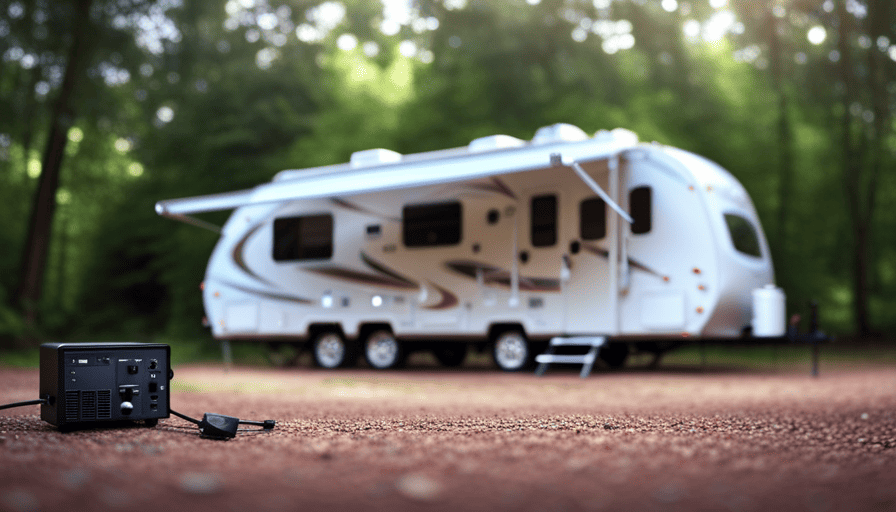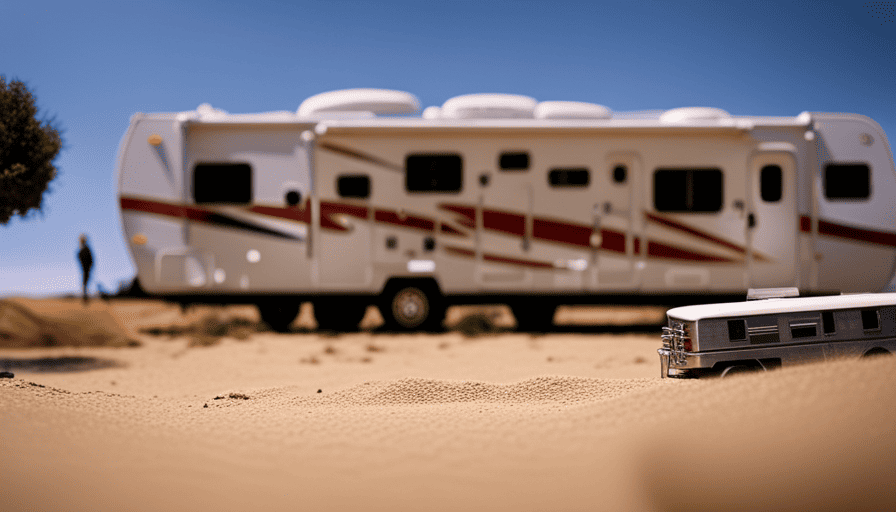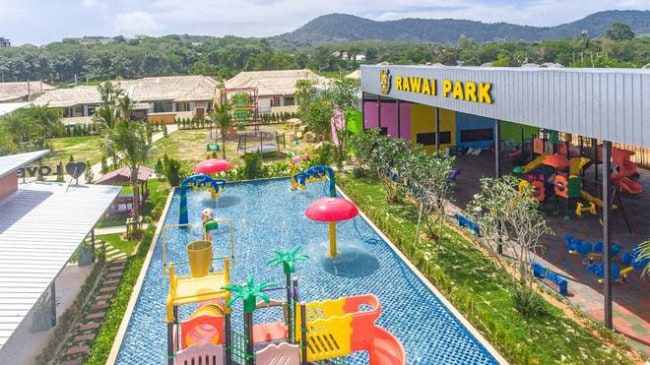So, you’ve made the choice to set out on a camping journey, your dependable camper trailing behind. Ah, the beauty of nature, the crisp air, the tranquility…and the perpetual demand for electricity. Indeed, even amidst the wild, our dependence on electric power appears inescapable.
But fear not, my fellow campers, for I am here to guide you through the perplexing world of generators.
Now, I know what you’re thinking – ‘What? Me? Deal with all those technicalities and calculations?’ Oh, dear reader, worry not. I shall break it down for you in the simplest terms possible.
In this article, we will explore the fascinating realm of wattage requirements for running a camper. We will delve into the intricacies of calculating power requirements, determining appliance wattage, and even consider the starting wattage of certain devices.
So, grab your notepads and prepare to be enlightened, for your camping trip shall be powered like never before!
Key Takeaways
- Determining the power requirements of a camper is crucial for selecting the right wattage generator.
- It is important to calculate the wattage of appliances and electronics to determine the total power needed.
- Consideration should be given to starting wattage requirements for certain devices to avoid overload.
- Choosing a generator with sufficient wattage, fuel type, runtime, and noise level is essential for a successful camping experience.
Calculate your power requirements
Figuring out how much power you’ll need for your camper? Let’s calculate your power requirements!
To determine the wattage of generator you’ll need, you first need to calculate your power consumption. This involves considering several factors that can affect your power requirements.
The size and type of your camper are important factors to consider. Larger campers with more appliances and electronics will require more power. Additionally, the number of people staying in the camper and the duration of your trip can impact your power needs. Are you planning on using your appliances and electronics sparingly or will they be running continuously?
You also need to take into account the specific appliances and electronics you’ll be using in your camper. Each device has a power rating, measured in watts, which indicates the amount of power it consumes. Make a list of all the devices you plan to use and their respective wattages.
With these factors in mind, you can estimate your power requirements by adding up the wattages of all your appliances and electronics. This will give you an idea of the minimum wattage your generator should have to meet your needs.
Now that we’ve calculated your power requirements, let’s move on to determining the wattage of your appliances and electronics.
Determine the wattage of your appliances and electronics
To accurately determine the power requirements for your camper, it is important to assess the wattage of each individual appliance and electronic device you plan to use. This will help you determine the size of generator needed to power your camper effectively. To make this process easier, I have created a table that lists common appliances and their corresponding wattages.
| Appliance | Wattage (W) |
|---|---|
| Refrigerator | 120-600 |
| Air conditioner | 700-3500 |
| Microwave | 600-1500 |
| Television | 50-400 |
Determining power needs is crucial to choosing the right generator. Start by listing all the appliances and electronics you plan to use in your camper, and their respective wattages. Add up the wattages to get a total power requirement. This will give you an idea of the minimum wattage your generator should have.
Once you have determined the total wattage, it is important to consider the starting wattage of certain devices. Appliances like air conditioners and refrigerators often have a higher starting wattage, which is the initial surge of power needed to get them running. Make sure to choose a generator that can handle these higher starting wattages to avoid any power interruptions.
In the next section, we will discuss how to consider the starting wattage of certain devices without oversizing your generator.
Consider the starting wattage of certain devices
When it comes to powering your camper, don’t forget to take into account the extra electricity needed to kickstart certain appliances like air conditioners and refrigerators, as it’s the spark that ignites a smooth journey.
The starting wattage of common camper appliances can vary significantly, so it’s crucial to consider these factors when choosing a generator for your camper.
-
Air Conditioner: Air conditioners consume a substantial amount of power when starting up. Depending on the size and efficiency of the unit, it can require anywhere from 1,500 to 3,500 starting watts.
-
Refrigerator: Refrigerators also draw a surge of power when they start. Typically, a refrigerator will need around 600 to 800 starting watts, but this can vary depending on the model and size.
-
Microwave: If you plan on using a microwave in your camper, it’s essential to account for its starting wattage. Microwaves usually require around 1,000 to 1,500 starting watts.
Choosing a generator with sufficient wattage for your needs is crucial to ensure that all your appliances and electronics can start up smoothly. By considering the starting wattage of common camper appliances, you can avoid any power shortages or issues while on the road.
Choose a generator with sufficient wattage for your needs
Selecting a generator that meets your power requirements is vital in ensuring a seamless journey with all your appliances functioning smoothly. When choosing the right generator for your camper, it’s important to consider your power requirements to avoid any disruptions during your trip.
Start by calculating the wattage needed for all your appliances and devices that’ll be used simultaneously. This includes items like air conditioning units, refrigerators, microwaves, and other electrical devices.
To choose the right generator, look for one that has a wattage rating slightly higher than the total wattage of all your appliances combined. This’ll ensure that the generator can handle the starting wattage of certain devices, which can be significantly higher than their running wattage. It’s also important to consider any future power requirements or potential additions to your camper that may increase your power needs.
By choosing a generator with sufficient wattage for your needs, you can avoid overloading the generator and potentially damaging your appliances. This’ll also ensure that your camper’s electrical system operates efficiently and reliably throughout your journey.
Now, let’s consider the fuel type and runtime of the generator to further optimize your camping experience.
Consider the fuel type and runtime of the generator
Considering the fuel type and runtime of your chosen generator is crucial for optimizing your camping experience, as it allows you to gauge the efficiency and longevity of the power source for all your electrical needs. When selecting a generator for your camper, there are a few key points to keep in mind:
-
Fuel efficiency: Look for a generator that’s fuel-efficient, as this’ll help you minimize both the environmental impact and the cost of running the generator. Options like propane or diesel generators tend to be more fuel-efficient compared to gasoline generators.
-
Generator maintenance: Regular maintenance is essential to ensure the smooth operation of your generator. It’s important to follow the manufacturer’s guidelines for maintenance tasks such as oil changes, filter replacements, and spark plug inspections. Proper maintenance not only prolongs the lifespan of the generator but also ensures optimal fuel efficiency.
-
Runtime: Consider the runtime of the generator, which refers to the duration it can run on a full tank of fuel. This is particularly important if you plan to use the generator for extended periods without access to refueling. Look for a generator with a runtime that meets your camping needs.
-
Noise level: Finally, take into account the noise level of the generator. A noisy generator can disturb the tranquility of your camping experience and annoy your fellow campers. Look for a generator that operates quietly, especially if you plan to camp in quieter areas or campgrounds with noise restrictions.
Considering these factors will help you make an informed decision when choosing a generator for your camper. Now, let’s delve into the next section and explore how to take into account the noise level of the generator.
Take into account the noise level of the generator
Don’t forget to factor in the noise level of your chosen generator to ensure a peaceful and enjoyable camping experience. When it comes to generator maintenance, it’s important to consider the noise level as it can greatly impact your overall experience.
Excessive noise can disturb your camping neighbors and even wildlife, not to mention it can be quite bothersome for you as well. To minimize noise, it’s recommended to choose a generator with a lower decibel rating. Look for models specifically designed for camping or labeled as ‘quiet’ generators.
Additionally, regular generator maintenance is crucial for optimal performance and noise reduction. Keep the generator clean and free from debris, as this can affect its noise level. It’s also essential to follow generator safety precautions, such as positioning it on a stable, level surface away from flammable materials.
By considering the noise level and maintaining your generator properly, you can ensure a peaceful camping experience.
As we move on to the next section about considering the portability and size of the generator, it’s important to find a balance between noise reduction and other important factors.
Consider the portability and size of the generator
When considering the noise level of a generator, it’s important to also take into account its portability and size.
These factors play a crucial role in determining the overall convenience and practicality of using a generator for your camper.
Firstly, the portability of a generator is essential, as it allows for easy transportation and maneuverability. However, it’s important to note that there are certain limitations when it comes to portability. Some larger generators may be more difficult to move around and may require additional assistance or equipment. On the other hand, smaller and more compact generators are generally easier to handle and transport.
Secondly, the size of the generator is another important consideration. Different generators come in various sizes and power capacities. It’s crucial to select a generator size that’s appropriate for your camper’s power needs. Opting for a generator that’s too small may not provide enough power to run all the necessary appliances and devices in your camper. Conversely, choosing a generator that’s too large may result in unnecessary fuel consumption and added weight.
To determine the right generator size, it’s recommended to research customer reviews and ratings of different generators. This will provide valuable insights and help you make an informed decision about the most suitable generator for your camper.
Research customer reviews and ratings of different generators
The sheer abundance of customer reviews and ratings for various generators can be overwhelming, but they provide invaluable insights for selecting the perfect power source for your camping adventures. To help you navigate through this vast sea of information, I have compiled a table comparing the pros and cons of inverter generators from different brands that are suitable for camping.
| Generator Brand | Pros | Cons |
|---|---|---|
| Honda | Quiet operation, fuel-efficient | Expensive |
| Yamaha | Reliable, compact | Limited power output |
| Champion | Affordable, versatile | Louder than other brands |
| Westinghouse | Durable, good value for money | Heavier than competitors |
When considering the pros and cons of inverter generators, it is important to prioritize your specific needs. For instance, if noise is a concern, Honda and Yamaha generators are known for their quiet operation. On the other hand, if budget is a major factor, Champion and Westinghouse offer more affordable options. It’s also worth noting that Yamaha generators may have limited power output compared to other brands.
Customer reviews and ratings offer valuable insights when comparing generator brands for camping. By considering the table above and weighing the pros and cons, you can make an informed decision about which generator will best suit your needs. In the next section, I will discuss the importance of consulting with experts or experienced campers for recommendations, further enhancing your decision-making process.
Consult with experts or experienced campers for recommendations
Seeking advice from experienced campers or experts can provide valuable recommendations when selecting the perfect generator for your camping adventures. When it comes to camping, having a reliable source of power is crucial, and understanding the benefits of solar power for campers is essential. Solar power offers numerous advantages, such as being eco-friendly, silent, and cost-effective in the long run. By harnessing the sun’s energy, you can power your camper without relying solely on traditional generators.
Additionally, it’s important to know how to properly maintain a generator for camping. Regular maintenance ensures that your generator operates efficiently and extends its lifespan. Some key maintenance tasks include checking the oil levels, cleaning or replacing the air filter, and inspecting the spark plug. Following the manufacturer’s guidelines and scheduling routine maintenance will help prevent unexpected breakdowns during your camping trip.
As you plan for your camping adventure, it’s crucial to purchase and test your generator before your camping trip. This will allow you to familiarize yourself with its operation and ensure that it meets your power needs. Testing the generator in advance gives you the opportunity to address any issues or make necessary adjustments. With a properly maintained and tested generator, you can embark on your camping trip with the peace of mind that you have a reliable power source to support your needs.
Purchase and test your generator before your camping trip
Before I head out on my camping trip, I don’t forget to purchase and test my generator to ensure a reliable source of power for all my outdoor adventures.
Testing the generator efficiency is crucial to determine if it can meet the power requirements of my camper. To do this, I compare different generator models and their specifications.
First, I consider the wattage capacity of the generator. I need to ensure that the generator I choose can handle the power demands of my camper. I consult the manufacturer’s recommendations for my camper’s power requirements and match it with a generator that has a similar or higher wattage capacity.
Next, I test the generator’s efficiency. I measure the fuel consumption and runtime of the generator under different loads. This helps me determine how long the generator can run on a full tank of fuel and how efficiently it uses fuel.
In addition, I look for features such as noise level, portability, and ease of use. These factors can greatly enhance my camping experience.
By purchasing and testing my generator before my camping trip, I can ensure that I have a reliable source of power. I can confidently enjoy my outdoor adventures knowing that I have made the right choice in selecting a generator that meets my camper’s power requirements.
Frequently Asked Questions
What are some factors to consider when choosing a generator for a camper?
When choosing a generator for a camper, several factors should be considered.
Generator size is crucial as it determines the amount of power it can provide. It is essential to select a generator that can meet the camper’s power requirements without overloading.
Fuel efficiency is also important, as it affects the generator’s runtime and cost-effectiveness.
By considering these factors, you can ensure that the generator you choose is suitable for your camper’s power needs and offers optimal fuel efficiency.
How do I determine the power requirements of my camper?
Determining the power requirements of my camper involves a methodical calculation of the various electrical appliances and systems it’ll be running. I must consider the wattage of each individual device and the total energy consumption over a given period.
By analyzing these factors, I can accurately calculate the wattage needed to power my camper. This calculation is crucial in determining the appropriate generator wattage for my specific needs.
What appliances and electronics typically require the most wattage in a camper?
Camper power consumption varies depending on the appliances and electronics used. It is crucial to determine the wattage requirements of each device to ensure choosing the right generator.
Appliances like air conditioners, refrigerators, and microwaves typically require the most wattage. Electronics such as TVs, laptops, and chargers have lower power demands.
By assessing the power needs of these devices, one can select a generator with sufficient wattage to meet the camper’s power requirements.
Is it important to consider the noise level of a generator for camping trips?
Considering the noise level of a generator is crucial for a peaceful camping experience. It’s essential to prioritize fuel efficiency to ensure longer camping trips without frequent refueling. When it comes to generator brands for camping, the best options are renowned for their quiet operation and reliability. These brands often employ advanced technologies to minimize noise levels while still providing sufficient power for all your camping needs.
How can I ensure that the generator I purchase is reliable and meets my needs?
To ensure that the generator I purchase is reliable and meets my needs, I must prioritize generator maintenance and fuel efficiency. This involves regularly inspecting and servicing the generator, such as changing the oil and filters.
Additionally, choosing a generator with fuel-efficient features, like an automatic idle control, can help optimize fuel consumption.
Evaluating the manufacturer’s reputation for producing dependable generators and reading customer reviews can also assist in selecting a reliable generator.
What Is the Appropriate Wattage for a Generator to Power a Camper?
When considering the appropriate wattage for a generator to power a camper, it is crucial to assess the specific requirements. A higher watt generator camper requirements can support multiple appliances simultaneously, including air conditioners and microwaves. Smaller campers may suffice with a lower watt generator, ensuring efficient power supply during outdoor adventures.
Conclusion
In conclusion, choosing the right watt generator for your camper is crucial to ensure a smooth and comfortable camping experience. By calculating your power requirements and considering the wattage of your appliances, you can determine the necessary wattage for your generator.
Additionally, considering the starting wattage of certain devices, fuel type and runtime, as well as the portability and size of the generator, are all important factors in making your decision. Researching customer reviews and consulting with experts or experienced campers can provide valuable insights.
For example, John, a camper who used a 4000-watt generator for his camper, was able to power his air conditioner, refrigerator, and other essential appliances without any issues, making his camping trip enjoyable and hassle-free.










